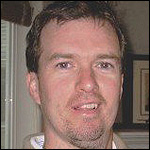Jacob Close brings ideas as new WWGCSA president
by Tony Dear
Jacob Close is just the sort of man you want maintaining your golf course.

The head superintendent at Sudden Valley Golf Course outside Bellingham for the last four years, Close, 34, is well on the way to turning a once dark and soggy course into a firm and airy layout with the sort of healthy turf members could only dream about previously.

When Close moved from Seattle Golf Club, where he had been the assistant superintendent since 2007, to Sudden Valley in March 2011, it was apparent the course he inherited needed a fresh injection of energy and ideas.
With a full-time staff of six, Close got to work increasing the soil’s sand content to improve its drainage, clearing trees and thinning branches to allow more sunlight to reach the grass, and re-establishing the original size of the greens architect Ted Robinson had created in 1971.
“We’re getting there,” he says. “But, of course, there is always work to do.”
Married with a one-year-old daughter, Close grew up in Corvallis, Ore. where his father worked in forestry. He began working during school breaks at a course in nearby Albany at the age of 16, though without any serious consideration of a future in golf course maintenance.
“Actually, I saw my future in chemical engineering,” he says. “The more I worked at the golf course, though, the more conversations I had with career superintendents. So maintaining golf courses for a living became a viable option, and I really threw myself into it.”
While at Oregon State University where he majored in Turf and Landscape Management, Close interned at both Waverley Country Club in Portland and the venerable Cypress Point on the Monterey Peninsula in California where he not only advanced his knowledge of cool-season turf, and poa annua in particular, but also worked on the renovation of three holes.
His first position after graduation was at the Reserve Vineyards in Aloha, Ore. A year later he moved to Broadmoor Golf Club in Seattle where he served as irrigation technician. By then it was clear – and had been for some time, truth be told – Jacob Close was something of an up and coming star in Pacific Northwest golf maintenance circles.
It was no surprise when he was elected to the board of the Western Washington Golf Course Superintendents Association (WWGCSA) in 2010.
Steve Link, head superintendent at Skagit G&CC, was the organization’s president last year, Close his vice-president. The two had known each other since around 2006, giving Link plenty of time to observe Close’s progress.
“Jacob is very organized and decisive,” he says. “He has always been the person to go to when things need to get done. I’ve worked with him on and off for nearly 10 years, and his energy and dedication have always impressed me.”
Paul Ramsdell, executive director of the WWGCSA, likewise recognizes the value of Close’s involvement. “Jacob has worked at some of the finest clubs up and down the West Coast and already accumulated great knowledge and experience,” he says. “He is an invaluable asset to the Association.”
In January, Close replaced Link as president. He is determined to have a positive impact by continuing to schedule the sort of meetings and attract the sort of expert speakers from whom he has benefitted in the past. “We bring in people whose knowledge and experience are vital to our members,” he says. “I’ve been to many meetings with a variety of subjects – cultural practices, rolling, chemical application, disease prevention, etc. They’ve all had a profound influence on how I operate.”
One issue Close suspects might come up sometime during his term as president is the game’s decreasing participation numbers. Decreased participation reduces a course’s income, of course, and maintenance budgets rarely survive the general manager’s cuts.
Close, resourceful as ever, would like to experiment at Sudden Valley by turning the water off during the summer (from the fairways at least), and growing a fescue nursery with a view to introducing the far less needy, but equally less verdant, turf to the course. He suspects neither move would go down terribly well though.
“In America, people want their golf courses green,” he says. “That’s fine, everyone likes green. But if they are firm, they’re more fun to play and cost less to maintain. For now, that usually means brown turf, which the majority of golfers don’t like. I think we need to work towards firm, green turf.”
The sort of turf, in fact, Close expects to see in June at Chambers Bay where he will be volunteering during U.S. Open week. “I thought the course was a little new in 2010 for the U.S. Amateur,” he says. “There was no thatch build-up so the ground was very firm. Every course needs a little thatch. Now the turf is more settled and will have more moisture than it did for the Amateur. That was in August; the U.S. Open is in June. I think the turf should be perfect.”
At Chambers, Close will be ready to roll, rake, and fill at five o’clock every morning and be back at the course in the evening for a few more hours’ graft. He’ll bring just the sort of industry to University Place that he’s demonstrated at Sudden Valley.
And he’ll love every second of it.
A former British PGA apprentice professional and member of the University of Liverpool golf team, Tony Dear is an award-winning golf writer. He contributes to numerous golf publications on both sides of the Atlantic, and has authored several books on golf. He manages his own website, bellinghamgolfer.com.

